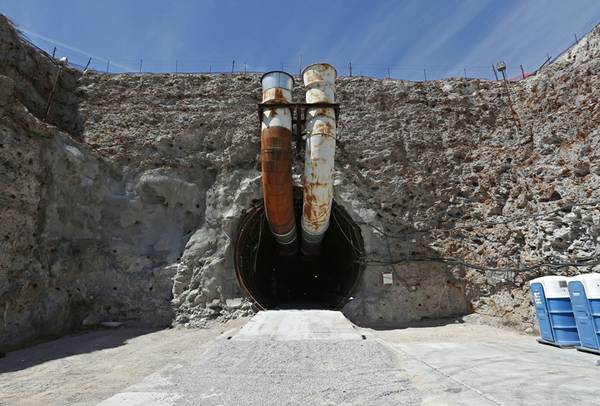Related Coverage
A nuclear waste summit in Las Vegas brought Nevada’s opposition to a proposed Yucca Mountain nuclear waste repository up against rural counties' calls for hearing the science behind the project.
Wednesday’s “Yucca Mountain Restart” discussion at the RadWaste Summit featured Robert Halstead, executive director of the governor’s Agency for Nuclear Projects, and Nye County Commissioner Dan Schinhofen. The two discussed the state’s multimillion-dollar investment in the Yucca Mountain fight, and the many steps and options ahead for the massive project.
Yucca Mountain is in Nye County, which stands with eight other rural counties in calling for the licensing process to move forward so that the science can be heard. Schinhofen renewed those calls Wednesday, saying this is a national security issue, not a partisan one.
Most voters in the state are opposed to the proposed repository. Nevada is putting roughly $7.2 million toward the Yucca Mountain fight over the next two years.
“The state Legislature has really shown support for this,” Halstead said.
Schinhofen said the state has spent $50 million fighting the project since 2002, while Nye County has nowhere near the same resources. Halstead noted that federal funds made up about half of that $50 million.
“Nye County ― we don’t have any money,” Schinhofen said.
The state has more than 200 contentions against the project. Halstead said the state is preparing more contentions to argue against the project, should the licensing process move forward.
Schinhofen said that when it comes to safety, there is always a possibility for an accident.
“But you try to mitigate that,” he said. “The state now, that’s really where their role should be. How do we get the best safety protocols in place?”
Schinhofen said Nye County welcomes the state’s new contentions and wants them to be heard.
“The state feels the state can’t win in this,” Schinhofen said after the panel. “Well, if they would take the other view that this is a multibillion-dollar, multigenerational project, if it’s found to be safe, the state wins. I mean, we win big. This rivals the Hoover Dam. It’s a huge project that would bring infrastructure, it would bring jobs, it would bring high-paying jobs, it would bring money to our universities.”
The Nuclear Regulatory Commission decided in August to start gathering information on the Yucca Mountain project, which has been dead in the years since it lost funding under former President Barack Obama and then-Sen. Harry Reid, D-Nev. Schinhofen said this move hurt Southern Nevada, not just his county.
“Doing nothing is not an option,” he said. “Nuclear waste continues to sit around the country posing a national security concern.”
Millions of pages of documents need to be gathered to start rebuilding the framework for handling the licensing process. Schinhofen said that while the state’s response to the NRC’s information gathering was typically negative, Nye County officials told him they had the documents and could hand them over.
“It’s not that big of a lift, but it needs to move forward,” he said.
Schinhofen said it’s the NRC’s job is to independently assess the suitability of the site, which has also been floated as a possible location for repurposing and recycling. He cited Rep. Mark Amodei, R-Nev., who has said that the site should not just be a nuclear waste dump, but also a “bastion of nuclear research and reprocessing.”
The rest of Nevada’s congressional delegation, meanwhile, is behind the Nuclear Waste Informed Consent Act, which would require local consent for a permanent repository. Legislation under consideration says consent is needed for temporary sites, but not at Yucca Mountain. The NRC is considering applications to host interim sites in Texas and New Mexico.
“It would change the tone” of the conversation, Halstead said, if officials added the provisions in the Consent Act to legislation that seeks to move the project forward.
Halstead said deep distrust between the state and government was sown in the ’80s when the Nuclear Waste Policy Act was amended and Yucca Mountain became the sole site for consideration.
“This type of proceeding is inherently adversarial,” he said. “People have different views of the truth. If in fact the proceeding starts, we’re probably the party that’s best prepared to show up at a case management conference on 60 or 90 days’ notice.”
The panel was part of the 11th annual summit, which was expected to draw more than 350 commercial and federal radioactive waste officials to Las Vegas over the course of three days.


Join the Discussion:
Check this out for a full explanation of our conversion to the LiveFyre commenting system and instructions on how to sign up for an account.
Full comments policy